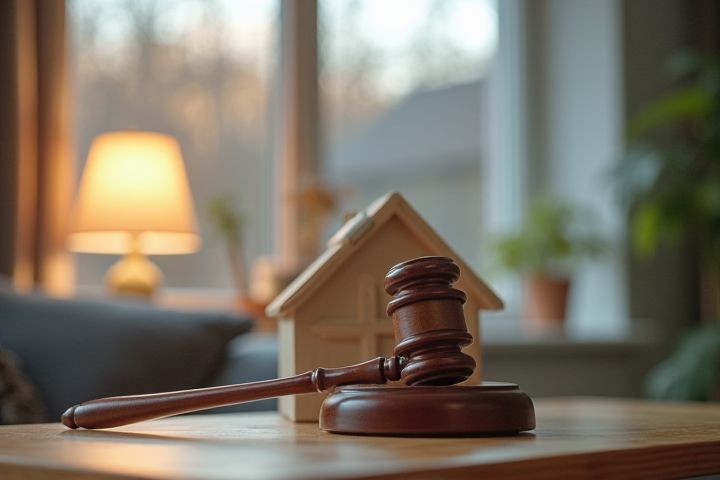
To legally Airbnb a house, you must first understand and comply with local regulations governing short-term rentals in your area. Many cities require homeowners to register their property, obtain permits, or pay specific taxes related to short-term leasing activities. Review your homeowner's association rules and any lease agreements, as they may impose restrictions on subletting or short-term rentals. It's essential to ensure your property meets safety and health standards, such as having smoke detectors and proper emergency exits. By taking these steps, you can create a responsible and legally compliant environment for your guests.
Can You Airbnb A House Legally
Local Zoning Laws
To legally operate an Airbnb rental, it's essential to align with your local zoning laws, which dictate the types of activities permitted in specific areas. Many municipalities require a short-term rental permit, often demanding inspections and proof of insurance. Local codes may limit the number of rental days, commonly ranging from 30 to 90 days per year, depending on the area's regulations. Failing to comply with zoning laws can result in fines, legal action, or even eviction from your property.
Short-Term Rental Regulations
Understanding short-term rental regulations is crucial for legally listing your house on platforms like Airbnb. Many cities impose specific rules, including licensing requirements, tax obligations, and limits on rental days, which can vary widely. For instance, in New York City, hosts must register with the city and can only rent their primary residence for up to 30 days if they are present. Always check your local laws to ensure compliance, as violations can lead to hefty fines or removal from platforms.
Homeowner Association Rules
When considering Airbnb for your house, it is crucial to review your Homeowner Association (HOA) rules, as some associations may have strict regulations or outright bans on short-term rentals. Typically, HOAs may require homeowners to obtain approval or register their rental with the association, imposing specific guidelines you must follow. Many HOAs enforce minimum rental durations, often prohibiting stays shorter than 30 days, which can impact your ability to list the property. Violating these rules can lead to fines, legal action, or forced cessation of your rental activity, so thorough understanding of your HOA's specific policies is essential.
Property Insurance Requirements
When listing your house on Airbnb, you must consider property insurance requirements to protect your investment. Most traditional homeowner's insurance policies may not cover damages incurred during short-term rentals, necessitating a separate landlord or short-term rental policy. Many Airbnb hosts opt for a rental insurance policy that includes liability coverage ranging from $1 million to $2 million, safeguarding you against potential lawsuits. Verify your local regulations as some municipalities require hosts to maintain specific insurance coverage, ensuring compliance while operating your rental legally.
Tax Obligations
If you plan to Airbnb a house, understanding tax obligations is crucial for compliance. In the United States, short-term rental income is generally taxable and must be reported on your tax returns, including state and local taxes that can range from 5% to 15% depending on your location. Some cities require you to collect a transient occupancy tax, which can significantly impact your profits. You can also deduct eligible expenses such as maintenance, cleaning fees, and even mortgage interest, but maintaining thorough records of these expenses is essential to substantiate your deductions.
Registration or Licensing
To legally rent a house on Airbnb, you typically need to obtain the appropriate registration or licensing specific to your area. Many cities require hosts to register their property with local authorities, often involving a fee and proof of compliance with safety regulations. In some jurisdictions, you may also need to secure a short-term rental license, which can include inspections to ensure the property meets health and safety standards. Failing to register or obtain the necessary licenses can result in fines, legal issues, or a ban from hosting on platforms like Airbnb.
Safety and Health Regulations
To legally Airbnb a house, you must comply with local safety and health regulations, which can vary significantly by location. Most jurisdictions require a valid business license, liability insurance, and adherence to building safety codes, including smoke detectors and carbon monoxide alarms. Health regulations often include maintaining sanitation standards, conducting regular pest control, and ensuring safe water quality. Knowing these requirements can help you avoid fines and ensure a safe environment for your guests.
Landlord Approval
Airbnbing a house legally requires obtaining explicit approval from your landlord, as many lease agreements prohibit subletting without consent. Ensure you have a written agreement that outlines the terms of your rental arrangement, protecting both parties and clarifying expectations. In cities like San Francisco, for instance, short-term rentals are subject to local regulations, including registration with the city and adherence to occupancy limits. Always verify your lease terms and consult with your landlord to avoid potential legal issues.
Lease Agreement Conditions
You can legally list a house on Airbnb by adhering to specific lease agreement conditions. Ensure your lease allows short-term rentals; approximately 23% of leases have restrictions against subletting or short-term agreements. It is crucial to obtain written consent from your landlord if subletting is not explicitly permitted. Moreover, be aware of local regulations, as cities may require permits, impose occupancy taxes, or limit the number of rental days per year for compliance.
Neighbourhood Policies
To legally list your house on Airbnb, it's crucial to adhere to your neighborhood's regulations. Many areas require hosts to register with local authorities or obtain permits, which may involve specific guidelines like limiting rental days annually, often capped at 30 days for short-term rentals. You should check your homeowners association rules, as some prohibit short-term rentals altogether. Familiarizing yourself with these policies not only ensures legal compliance but also fosters good relations with neighbors.
